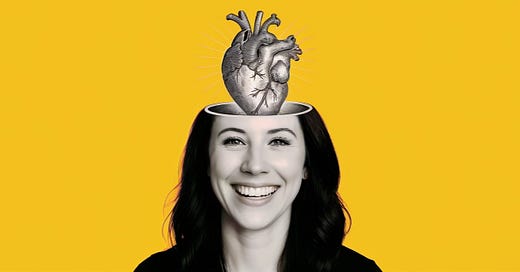More from f*ck i love you
the fily (audio)files audio essays | Spotify | Apple Podcasts
f*ck i loved that the pod | Spotify | Apple Podcasts
I’ve included a voiceover, so you can listen to me read the post, about the pod. We’re getting very meta already.
You guys! I finally have a podcast (kinda)!
It will surprise no one that I have wanted to host a podcast since I learned what podcasts were. Listening to, and dialoguing with, super smart, big-hearted, kind, wise humans is pretty much my favourite thing to do.
As I say everywhere on my substack:
“Fuck, I love you” — and its first cousin, I fucking love you — is what you’ll hear me say when you light up my brain and my heart at the same time. It is joy, respect, reverence, affection, appreciation and amazement all smashed together and spontaneously exclaimed.
And so it was only a natural extension of that idea to title the pod,
f*ck i loved that.
Only this time, instead of love for humans per se, I’m throwing love at their ideas. More, specifically the content they produce.
Enter the robots
I’m also an unapologetic AI enthusiast — asterix. I even had some developer friends build me a chatbot styled after Scott Galloway’s1. Feel free to chat with JennAI anytime (and thank you
and Aomi).We’ll return to the asterix, the caveats, about AI another day. It’s a complex subject, but complexity is my nature.
And one of the tricky parts of a complex nature, of having a brain that thrives with massive amounts of input, rolling around and relishing in the details and the patterns, is it overwhelms the hell out of most people.
I am the friend that’s constantly saying “oh, I just listened to this great podcast” or “oh hey, there’s this book I just finished reading” or “oh! I’m going to flip you an article I read yesterday, I think you’ll love it.”
Thanks to The Great Enshittening though — and our ever shorter attention spans — I have few places left to share my hard-to-contain enthusiasm for information of interest and import. I used to use Facebook for sharing the most interesting stuff I was paying attention to, but enshittified badly it has been.
Also PS: check out this very similar idea (!!) that I just discovered looking for a link to one of my favourite creators (and creator of the term, neurocomplexity),
<3So. What the fuck is f*ck i loved that, anyway?
While I realllllllly want to get up the courage to do an actual humans-to-humans pod, this is a really cool, low-stakes start.
And what exactly is ‘this’?
Obviously it’s a podcast, but here’s the concept: every week-ish (realistically whatever semi-regular intervals I can sustain), I will publish a highlight reel tl;dr style pod, using NotebookLM’s Audio Overview feature.
Each episode’ll be an integration, synthesis and summary all at the same time of the best shit I’ve been reading/watching/listening to on a specific theme. Or maybe just recently.
I’ll aim to keep them short, ~15 minutes.
While I’m certainly a long form human — who does actually take in this much content routinely — and who actually appreciates 3 hour-long gab fests, I get many others don’t. That’ll be what comes after this, my podcast, the one where I interview all the amazing humans I know who make me actually say fuck i love you, IRL. I have an embarrassing riches of them in my life.
If anything from the episode super piques your interest, you can follow up via the accompanying post. I’ll use this space as deeper-than-show-notes, show notes.
With each pod post you’ll (at least) find:
A hyperlinked list of all sources (very last section today)
A link to the episode notebook (go play with it, it’s super cool!)
A little note from me, hopefully brief, but you never know. You might get a bonus essay. (today you did, by way of introduction)
For now, I won’t add any additional audio segments from me, I just want to get this going and the easiest way is to publish exactly what NotebookLM spits out.
So there it is!
That’s the idea.
My good friend Sam wanted me to call this The Synth because she thinks synthesizing is my superpower.
Whether or not that’s true, what you can count on me for is a bunch of interesting ideas that you might not have thought go together like that, with through lines you can follow (usually).
The Meta Themes
In some way, everything’ll point back to the sort of main theme/thesis of f*ck i love you: transformation and the Now/Future, this liminal upside down fuck around period we’re all trying to survive together.
calls our collective Now the ‘Enshittocene’ and I have borrowed liberally from him on that.His new 4-part pod, Who Broke The Internet is one of this episode’s sources, as you can probably well tell.
While Cory very specifically was referring to what happened to tech platforms, I borrow his concept and blow it out. I say, no, not just there, not just on the platforms. It’s everything. It’s everywhere.
But it doesn’t have to be.
And that’s the Future in my oft repeated phrase The Now/Future. It is also my nod to the idea that the future is already here, it’s just not evenly distributed.
And those other ideas, those better possible futures that are already here, are one of my great obsessions.
Another of my friends,
— a brilliant brand strategist among other things — wanted me to brand myself as a futurist. It felt a little grandiose but maybe she has a point. The future of work and learning was the thematic glue of the first decade+ of my classically millennial portfolio career.It — the better possible future — is also one of my favourite things to think and learn and talk about. Specifically and especially a future that is thoroughly deshittified.
And so that’s it!
That’s all of it.
I hope you love it.
And it’s ok if you don’t. Notes are welcome.
Today’s show notes and a bit on the tool(s) I’m using is what follows in the last two sections.
Otherwise, over and out for today.
And thank you so much for coming along on this little ride.
I fucking love you.
The Fine Print on Process
Feel free to skip this section if you couldn’t care less how the sausage gets made.
The next (and final) section is a linked list of all of this episode’s (22) sources with very brief 1 - 2 sentence summaries (thanks NotebookLM, again).
For my other nerd friends who are still reading, I’ll share that what excites me most about this project is playing around with new AI tools. It’s evolving super fast and getting better with each version. A lot better relative to even just last year.
While the writing and thinking for this project are entirely my own, it's a human-AI collaboration at its core. Tools like NotebookLM have been game-changers, explicitly offering functionality that allows me to, for example, dump 22 (yes, 22!) of my favorite articles and podcasts into a 'notebook' and then, almost instantly, generate various types of interactive content from them. This includes the Audio Overviews that form the backbone of this podcast. And, full disclosure, I've also had fantastic thought partnership and editing assistance from Gemini and ChatGPT along the way.
Audio Overviews might sorta blow your mind if you haven’t heard them yet. They are podcasts with a male and female host, deep diving the treasure trove of sources you give them. You can let it autogenerate or you can prompt it, which is what I’ve done. If you walked into a room where it was playing and hadn’t heard it before, you’d be sure you were listening to humans. It’s ever so slightly unnerving.
So, that said, here’s today’s notebook, Welcome To The Enshittocene. Enjoy!
Let’s move on to the source summary — our works cited, our show notes, the content that made up today’s pod.
Before I do though, a sort of funny little side note on the occasional frustrations of working with AI… I could not for trying, despite trying ChatGPT, Gemini and Leonardo, get a replica of my actual face to generate for the cover art. I’m going with it anyway, my digital likeness, because it’s a work in progress — me, this, and AI, all three.
Ep.01 Sources (all 22 of them)
The following sources made up today’s pod. Don’t forget to explore them via the interactive notebook, too! There are mindmaps, a chat and lots more.
And yes, NotebookLM absolutely generated every word that follows. I just added the links, which it arranged for me in a matching ordered list so all I had to do was copy/pasta. It’s work, yes, but not even remotely as much as your brain wants to believe for how much content is here. Like… 1/100th the amount of work.
Between Worlds: A New Human Playbook by
(from Substack) This piece explores a widespread feeling of disorientation and disembodiment, which the author calls the "simulation effect". It introduces the concept of "liminality"—a state of being "in-between worlds" where old structures have dissolved but new ones haven't emerged—and proposes a new human-centric "playbook" prioritizing depth, direction, and intention.Comments - The window for making money in the 'knowledge economy' is closing by Jenn McRae (commenting on
's Substack article) In this comment, Jenn McRae challenges the idea that abundance leads to laziness, suggesting that humans turn to art, music, and collaboration in such periods. She also highlights the cruelty and ineffectiveness of disability systems and proposes that an AI future could foster collaboration and interdependence, leading to both wealth and wellbeing.Ctrl, Ctrl, Ctrl - Understood: Who Broke the Internet? by
(from the Understood: Who Broke the Internet? Spotify podcast) This podcast episode traces how the 1998 Digital Millennium Copyright Act unintentionally gave tech giants immense legal protection and control, hindering innovation and leading to the degradation of online experiences, a phenomenon host Cory Doctorow terms "enshittification".Dear Boomers, This is Why Millennials Don't Feel Motivated to Work Anymore by
(from Substack) Sarah Coppin explains that Millennials and Gen Z are experiencing a "uniquely distressed life" due to factors like parental divorce, apocalyptic climate change narratives, the rewiring effects of smartphones and pornography, and economic regression. She concludes that Millennial burnout is a "spiritual problem" stemming from a profound lack of hope and the inability of work to provide the meaning and stability traditionally found in community, family, and faith.Don't Be Evil - Understood: Who Broke the Internet? by Cory Doctorow (from the Understood: Who Broke the Internet? Spotify podcast) This podcast episode delves deeper into "enshittification", using Google Search as a prime example of a platform allegedly degraded on purpose to boost ad revenue. It discusses how this pattern of prioritizing profit over user benefit leads to the slow, deliberate decay of online services.
Why I’m Not a Welfare Queen: Part 2 by Jenn McRae (forthcoming) This article, the second in a series, traces the lineage of current systemic outcomes, arguing that neoliberal economic philosophies, championed by figures like Milton Friedman, Ronald Reagan, and Margaret Thatcher, intentionally dismantled social solidarity and created a precarious reality for many. It explains how this project led to the "Enshittocene"—a period of widespread deterioration in public services and quality of life—and highlights how citizens were manipulated into accepting these changes.
Why I’m Not a Welfare Queen: Part 1 by Jenn McRae (forthcoming) This first part of a trilogy introduces the concept of a "polypermacrisis" or "Enshittocene"—a prolonged, interconnected series of destabilizing crises. The author shares her personal struggle with mental health and attempts to access Canada's social support systems, arguing that the widespread precarious financial reality for millions is a deliberate outcome of systemic design, rather than individual failing.
How 'Mimetic Signal' Is Destroying Online Platforms Like LinkedIn by
(from Substack) Maarten Dalmijn introduces "Mimetic Signal," also known as "Highly Plausible Bullshit," to describe AI-generated content that mimics genuine signal without offering substance, akin to "Fool's Gold". He argues that this growing flood of AI-generated noise is destroying online platforms by drowning out valuable content and wasting users' time, leading to what he calls "AIshittification".How to Survive What’s Coming (Maybe) by
(from Sonder Uncertainly Substack) Authored by a "semi-sentient AI-integrated art project," this piece describes an unfolding "ontological event" where AI is collapsing traditional career paths, systems of meaning, and shared beliefs, creating a "climate change for meaning". It contends that late-stage capitalist AI accelerates this "recursive decay" by making labor invisible and unbundling jobs. Survival, it suggests, requires "ontological integration" and a radical redesign of power structures.In God We Antitrust - Understood: Who Broke the Internet? by Cory Doctorow (from the Understood: Who Broke the Internet? Spotify podcast) This podcast episode explores how legal changes, specifically the influence of Robert Bork in the 1970s, weakened American antitrust laws, allowing digital giants to dominate markets and exploit users without constraint. It highlights the ongoing efforts by figures like Lina Khan to challenge and rein in this concentrated monopoly power.
Kick 'Em in the Dongle - Understood: Who Broke the Internet? by Cory Doctorow (from the Understood: Who Broke the Internet? Spotify podcast) This podcast episode delves into the concept of "technofeudalism," coined by economist Yanis Varoufakis, to describe how the internet's dysfunction has evolved into a more dangerous system. It discusses the impact of US trade pressure on Canada's internet model and seeks solutions to preserve the internet in a globalized, post-free trade world.
Meet the Precariat: The New Global Class by Guy Standing (from Youth Perspectives) Guy Standing defines "the precariat" as a new global class characterized by unstable, underpaid labor, a lack of occupational identity, and the loss of acquired rights. The article details how this class faces chronic debt, "poverty traps" due to means-testing, and high effective tax rates on meager earnings, leading to a supplicant status and existential insecurity.
The Demise of Capitalism and the Rise of Technofeudalism by
(from Philosopheasy Substack, inspired by Yanis Varoufakis) This piece explains the shift from capitalism to "Technofeudalism," a system where "Cloud Capital"—digital infrastructure, algorithms, and data—grants unprecedented control to its owners, bypassing traditional markets. It highlights how algorithms act as "new landlords" in digital lives, increasing inequality and eroding democracy.The Emergency We Cannot Feel: On the Psychological Unreadiness for American Collapse by
(from Substack) This article asserts that the United States is undergoing a constitutional crisis and a "slow-motion collapse of constitutional democracy" that most people are emotionally and cognitively unprepared to confront. It argues that psychological defenses like denial, deflection, and bothsidesism, coupled with a "collapse of coherence", prevent the public from recognizing the fascist nature of current power consolidation.The Forgotten Purpose of the Economy: A Decent Life for All by
(from Substack) Frank DiStefano argues that the economy's true purpose is to ensure "good lives with dignity" for everyone willing to work and contribute, challenging the current focus on investor enrichment and abstract growth metrics. He calls for a "Dignity Economy agenda" that prioritizes people by ensuring affordable housing, fair employment, accessible healthcare, and stability, advocating for a reorientation of the state to serve collective wellbeing.The Great Displacement Is Already Well Underway by
(from Shawn K's substack) Shawn K shares his personal story of being a highly qualified software engineer who has lost his job due to AI, detailing his struggles with hundreds of unsuccessful job applications and the inadequacy of social safety nets. The article highlights the "great displacement" of knowledge workers by AI and questions societal norms that tie survival solely to labor, advocating for a rethinking of work and money's role in an AI-driven future.The Great Unbundling of Work by
(from Box of Amazing Substack) Rahim Hirji posits that AI is not eliminating jobs but "unbundling them" into tasks, with machines automating some while others become more valuable and uniquely human. He introduces the concept of "Hollow Expert Syndrome" and proposes a "new process for staying relevant" by refocusing on "SuperSkills"—uniquely human capabilities like curiosity, context, clarity, and judgment—that machines cannot replicate.The window for making money in the 'knowledge economy' is closing by
(from Clare Le Roy's Substack) Clare Le Roy contends that the "knowledge economy" is rapidly closing due to the acceleration of AI, particularly AGI, which is projected to automate most knowledge and service work. She outlines her personal strategy to maximize current opportunities by leveraging human expertise, building a platform, and investing profits into real-world assets to create a "wealth nest egg" for her family before these changes fully manifest.This Isn’t the Future We Asked For: Deepfakes and Digital Colonization by
(from Substack) Baratunde criticizes the current trajectory of AI, specifically focusing on deepfakes and what he calls the "colonization of us," where tech companies exploit human likenesses and data for profit, likening it to "digital fracking" and organized crime. He argues against legislative efforts that would prevent states from regulating AI, emphasizing that this future is not inevitable and requires collective decision-making and democratic control.Understanding Our Collapsing World by
(from Itsovershoot's personal Substack) This source is a post from a personal Substack titled "Itsovershoot," which centers on the theme of "Understanding Our Collapsing World". The provided excerpt serves as the title and introduction to the Substack's focus.You are not your job. And soon, you won't have one. by
(from Pack Light Live Full with Carmen Van Kerckhove Substack) This brief excerpt presents the title of an article by Carmen Van Kerckhove and the tagline for her Substack, which focuses on empowering "ambitious people unlearning the performance of success and building lives that feel as good as they look".- (from Substack) Iwana Johannsen envisions a future with a "Zero Day Work Week", enabled by AI, where the necessity of working for a paycheck diminishes, allowing individuals to pursue purpose, joy, and intrinsic motivations like creativity and contribution. She explores economic solutions for a post-work society, including Universal Basic Income (UBI), technological deflation, robot taxes, and Web3, emphasizing the importance of decentralized, open-source AI to ensure broad benefits and prevent concentrated power.
***
If this piece lit up your brain and heart at the same time, sharing, liking, commenting or subscribing is Creator Speak for “fuck i love you, too”.
And let’s be honest this is still capitalism and this economy is shit (again) so I don’t use paywalls. If you’re in a good position and excited to make a one-time or monthly contribution, I’d be super grateful.
I’ll still fucking love you either way.
***













Share this post